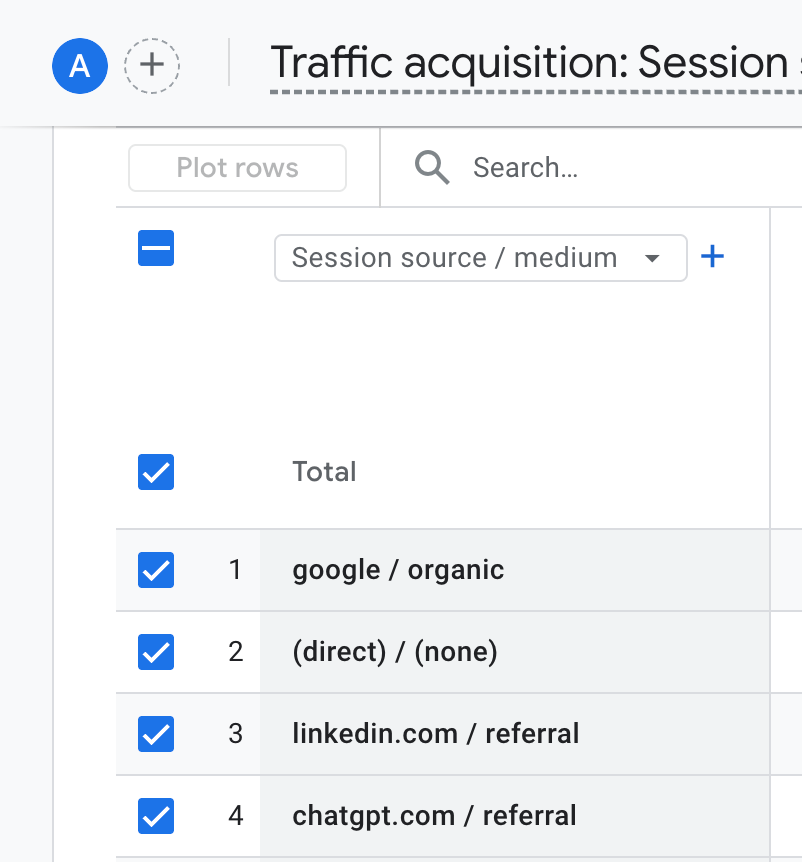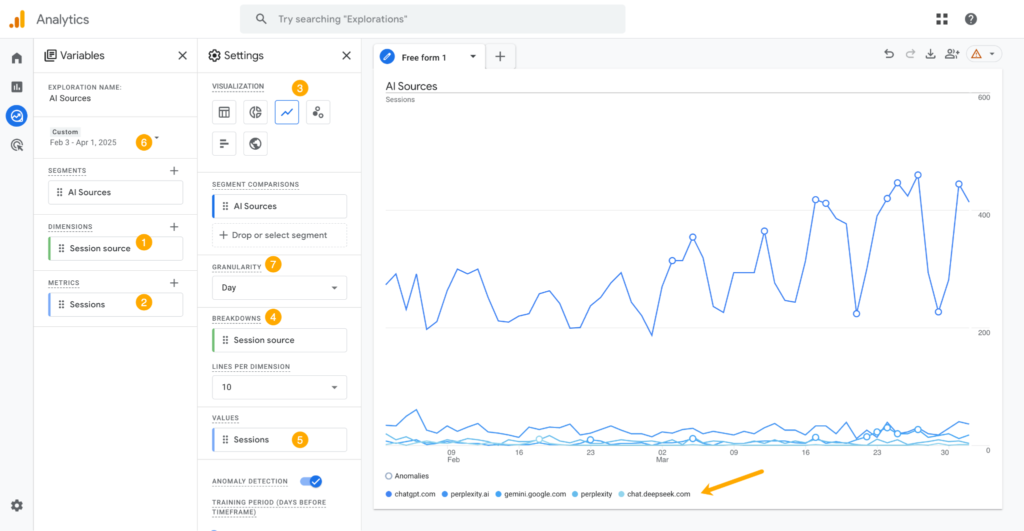Table of Contents Show
The AI Revolution in SEO & Digital Marketing
The SEO and digital marketing world is witnessing a revolutionary transformation powered by AI. User search journeys no longer end at Google’s search results page—they’re increasingly happening within the chat interfaces of ChatGPT, Gemini, Perplexity, and other AI platforms. This shift has made AI traffic tracking a crucial component of modern digital marketing strategy.
However, these valuable traffic streams often get mysteriously categorized as “Direct” or unclear “Referral” traffic in GA4 when they reach your website. This creates a massive blind spot in your analytics data, leaving you in the dark about one of your most valuable traffic sources. AI traffic tracking has become an essential practice for modern SEO professionals.
This article will dive deep into the 5 core reasons why AI traffic tracking is critically important, and how it’s reshaping your entire SEO and marketing strategy.
Key Takeaways on AI Traffic Tracking
- Tracking AI traffic is no longer optional—it’s the new competitive edge for SEO and digital marketing.
- User journeys increasingly start and end within AI platforms like ChatGPT, Gemini, and Perplexity.
- Understanding and segmenting this traffic is critical to:
- Uncovering hidden opportunities.
- Optimizing content.
- Accurately measuring your website’s true impact.
- Without proactive tracking, you risk:
- Missing out on valuable insights.
- Misreading performance data.
- Losing your advantage in the evolving digital landscape.

User Search Behavior Has Changed—Forever
The way people search has transformed dramatically. Users no longer just search for “keywords” expecting a list of blue links. They ask “questions,” give “commands,” and expect direct “answers” compiled by AI. Traffic coming from these sources represents users who already have preliminary answers and want to explore topics more deeply.
Risks of Not Implementing AI Traffic Tracking:
Without proper AI traffic tracking, you’re essentially operating with incomplete data that can lead to costly strategic mistakes:
- Misunderstanding trends: You’ll mistakenly think organic search traffic is declining without understanding the root cause—users have partially shifted their behavior to AI platforms.
- Slow response time: You won’t recognize this behavioral shift to adjust your content strategy, missing opportunities to capitalize on new user waves.
When I analyze websites that don’t have proper AI traffic tracking systems, I consistently see confused marketing teams wondering why their traditional SEO metrics don’t align with actual business results. The missing piece is often substantial AI-generated traffic that’s being misattributed.
AI Overview & Direct Impact on Website SEO
Google AI Overview is gradually dominating the top position on SERPs. Having your website cited in an AI Overview response is a new form of “credibility certification.” Clicks from these positions bring traffic with exceptionally high quality and conversion potential.
Without AI traffic tracking, you’re blind to the true performance of your most valuable traffic sources:
- Unable to measure ROI: You can’t determine whether your AI Overview optimization strategy (creating in-depth, structured, E-E-A-T focused content) is actually working.
- Missing data on your highest-value traffic source: You can’t differentiate between “premium” traffic from authoritative AI responses versus regular clicks, preventing you from scaling successful approaches.
I’ve observed that websites getting consistent AI Overview citations often see 40-60% higher conversion rates from that traffic compared to traditional organic search, but most site owners don’t realize this because they lack proper AI-generated traffic tracking.
Understanding User Intent & Behavior: Clear Insights from AI Sources
AI-generated traffic typically has very clear and specific user intent. They’re not just searching for “running shoes”—they might have asked AI “recommend the best running shoes for people with knee pain under $200.” When they click your link from that response, they’re already in the final stages of the consideration funnel.
The Data Contamination Risk:
- Polluting behavioral data: Mixing AI traffic with Direct traffic will give you incorrect insights about user journeys. The valuable data about time on page and bounce rates from these high-quality users gets diluted, preventing you from seeing their true value.
- Missing customer insight opportunities: You lose the golden opportunity to understand exactly which questions and specific problems are driving your most qualified prospects to your site.
Implementing AI traffic tracking is particularly crucial for e-commerce and service businesses where understanding user intent directly impacts conversion optimization and product development strategies.
Accurate Performance Measurement: No More Guesswork
“You can’t improve what you don’t measure.” To prove the effectiveness of your content and SEO activities, you need clean data. Properly attributing traffic to an “AI” channel provides a complete and accurate picture of your multi-channel marketing performance.
Budget Allocation Mistakes:
- Misallocated spending: Your reports become skewed. You might undervalue the effectiveness of Content/SEO channels when actually part of that success comes from AI traffic. This leads to budget cuts for activities that are actually delivering results “silently.”
- Unconvincing reporting: When presenting reports to management or clients, having dedicated AI traffic tracking data with impressive growth numbers provides strong evidence of your team’s adaptability and forward-thinking approach.
I’ve seen companies increase their content marketing budgets by 50% after implementing comprehensive AI traffic tracking and demonstrating its ROI to stakeholders who previously questioned content investments.
Optimize Content, Marketing, and Conversions for the AI Era
Content & Marketing Strategy Enhancement
When you know which pages and articles are attracting quality AI-generated traffic, you can analyze and scale successful formulas: create more in-depth content, directly answer complex questions, and optimize data structure (Schema markup).
Lead Generation & Conversion Tracking
More importantly, with proper AI traffic tracking, you can see how many leads and conversions this channel generates. You can create dedicated funnels to nurture these high-quality traffic sources.
Risks of Operating Blind:
Vague strategy: You’ll be “flying in fog,” not knowing what type of content to focus on producing to catch the AI wave.
Wasting potential customers: You miss the opportunity to optimize the user journey from AI to website for maximum conversion, letting an extremely high-quality customer source come and go without strategic retention and exploitation.
Identifying and Understanding Key AI Traffic Sources
Not all AI-generated traffic is created equal. Knowing the characteristics of each platform helps you tailor your content and understand your audience.
| AI Platform | Who Are They? | What It Says About Your Content |
|---|---|---|
| Google Gemini & AI Overviews | Users searching directly on Google, seeing AI-cited answers. | Your content is authoritative, well-structured, and directly answers search intent. |
| ChatGPT (OpenAI) | Deep researchers, learners, and problem-solvers. | Your content is foundational, in-depth, and trusted for learning and research. |
| Perplexity AI | Researchers, students, and users demanding high source credibility. | Your content is data-driven, unique, and often cited as a primary or quality source. |
| Microsoft Copilot | Users integrating Bing search with AI in Microsoft’s ecosystem. | Your content performs well on Bing, reaching overlooked but valuable audiences. |

Conclusion: Don’t Let AI Traffic Slip Through the Cracks
The rise of AI traffic represents a fundamental shift in how users discover and interact with content. By implementing proper AI-generated traffic tracking and optimizing for these sources, you’re not just adapting to current trends—you’re positioning your website for the future of search and discovery.
Remember: AI traffic tracking isn’t just another analytics metric—it’s a window into the evolving relationship between users, artificial intelligence, and your content. The websites that master AI traffic tracking today will dominate tomorrow’s search landscape.
FAQ: AI Traffic Tracking for Websites
How can I tell if my website appears in AI Overviews?
Currently, Google does not provide a direct report in Search Console for AI Overview appearances. The best approaches are:
- Manual check: Search your main keywords in incognito mode to see if your website is cited in the AI Overview section.
- Monitor indirect signals: Watch for sudden spikes in Direct or Referral traffic with unclear sources in GA4 and GSC.
- Proactive solution: Set up AI-generated traffic tracking to measure this more accurately.
How can I track traffic from AI platforms in GA4?
The core method is to use UTM Parameters:
- Create a special URL with tags like
utm_source(e.g., chatgpt) andutm_medium(e.g., ai_chat). - Use this URL when sharing on AI platforms.
- GA4 will automatically record and categorize this traffic for you.
Where can I find referral traffic sources in GA4?
- Go to Reports > Acquisition > Traffic acquisition.
- Check the Session source / medium column to identify traffic sources.
- Note: Many AI-generated traffic sources may not show up clearly (often recorded as direct or generic referrals like t.co), which is why using UTM parameters is so important.
Why should I track traffic from ChatGPT?
- Measure the effectiveness of your in-depth, educational, and explanatory content.
- Determine your authority and reputation as an expert in your field.
- Gain deeper insights into the research and learning needs of users coming from ChatGPT.
Why should I track traffic from Gemini?
- This is a crucial traffic source because it is closely tied to Google Search.
- Learn whether your content is trusted and displayed at the highest positions by Google.
- This traffic often has high purchase or action intent, helping you directly measure the ROI of modern SEO efforts.
Why should I track traffic from Perplexity?
- Perplexity is favored by users who value source accuracy and transparency.
- Tracking traffic from here proves your content contains unique data, thorough research, and is trustworthy.
- It affirms the academic quality and expertise of your website.









Comments 1
Comments are closed.